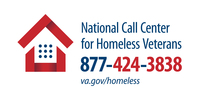VAnguard: Homeless Alabama Veteran Home At Last
Homeless Alabama Veteran Home At Last
By Tom Cramer
Thirty-eight-year-old April Rencher, who spent eight years in the Army, didn’t plan on becoming homeless. She didn’t plan on ending up in rehab, either.
“I lost my employment late last year,” she said in a tired voice. “I’ve been working since I was 14, so it was frustrating, losing my job. On top of that I had a crisis in my family, so everything sort of snowballed from there. Things got unmanageable for me. I guess I just got tired. My whole world came screeching to a halt, and I ended up homeless…
“I had become a very dark person,” she continued. “But then I finally got to a point where I could ask for help. It’s hard for us Veterans to ask for help, but I went to the VA here in Tuscaloosa and got into their residential rehab program. I knew I was going to get the care I needed. They’re helping me get well. They’re very supportive of me.”
Rencher paused for a moment, then added: “They saved my life, to be honest with you. They turned me around and helped me walk in the right direction. I still have good days and bad days, but I know I’m better today than I was yesterday.”
Rencher said learning about herself is playing a big role in her fight to recover her health, and her life.
“When I first got here my mindset was scattered,” she said. “But I’m working with the health care professionals here. They’re helping me answer the ‘why’ of things. They’re helping me clarify why I’m having some of the problems I’m having; why I was doing what I was doing. That was the main thing for me. That’s what made a big difference —understanding the ‘why.’
“I learned that I’d been neglecting myself. I was always focused on other things, this person or that person, and I never once looked at myself. But now I can actually look in the mirror and see the transformation that’s happening…
“For me to wake up in the morning, look in the mirror and like who I see…that’s very big for me,” she continued. “I can look at the sunshine now and appreciate it. I can look out the window and see the cats playing out there in the yard and that makes me laugh. It’s cool seeing them playing and not having a care in the world.”
The Army Veteran said one of the most beneficial aspects of residential rehab is the comradery she discovered there.
“The Veterans here support each other, pretty much the way we did when we were on active duty,” she explained. “Going through this transition with other Veterans makes it easier for me. They understand what I’m going through. They get it. I’ve met some really wonderful people here that I want to stay in contact with them.”
Rencher said the next step in her journey is finding a place to live after she leaves rehab.
“They have apartments right here on the grounds at VA!” she beamed. “I’ve filled out an application for one. I’m waiting to see if I get it. The place is called Valor Grove. If I could live there that would be good, because it would be easier to keep my appointments here at the hospital, easier to keep my treatment going.”
“We’re hopeful she’ll be able to get in there because it’s right here on our campus,” said Dave Gay Jr., Tuscaloosa’s homeless program coordinator. “We hope it works out for her, because all the support she needs is right here. This is what we’re here for…to help people put their lives back together. That’s why we come to work every day.”
“I still need some fine tuning, but so far so good,” Rencher said with a smile. “I’m working on building a new me.”
Article reprinted from the Fall/Winter 2015 issue of VANGUARD magazine (page 8).
Back to Success Stories Home »
Make the Call
Dial 1-877-4AID-VET
(1-877-424-3838)
Access VA’s services for homeless and at-risk Veterans, available 24/7.
Chat Online
VA Medical Center
(VAMC) Locator
Locate Your Local
VA Medical Center Now
Veterans who are homeless or at risk of homelessness can call or visit their local VA Medical Center (VAMC) and ask for a Homeless Coordinator. Use the VA locator tool www.va.gov/directory to find your nearest VAMC and call or visit today.

















